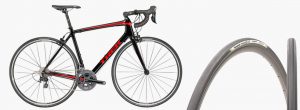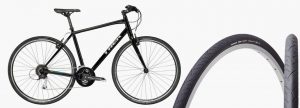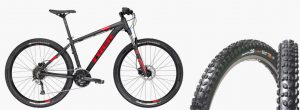Like everything else in the world today, there are no shortages of choices when it comes to bikes. So how do you figure out what is the right bike for you?
Step one, determine where you want to ride.
Typical choices are:
–Road Bikes designed exclusively for pavement riding.
–Path/Trail Encompassing everything from paved roads to dirt trails.
–Off Road These bikes are designed for Mountain Biking offroad.
Step two, how frequently do you plan on riding?
The cost of a bicycle can range from around $300 up into the tens of thousands. The most basic models use less durable materials like plastics rather than metals in the shifting components, and mild steel rather than stronger alloys for the drivetrain and cockpit. As the prices increase, stronger materials replace less durable materials, lending to a bicycle that will hold up better to frequent use. At a certain price (different for every category of bicycle), the durability doesn’t increase, but the instead, the weight begins to decrease. A lighter bicycle is easier to control and accelerate (making for a more enjoyable ride). Determining how frequently you intend to ride and weighing that against the bikes you are looking at will ensure you get the right bike for your needs.
Step three, why are you riding?
Fun and fitness, speed and adrenaline, or competition all put different strains on a bicycle. Be sure to match your riding style with the bike you get.
Step Four, What to ride.
Once you figure out the “Where”, “How frequently”, and “Why” questions, only the “What” remains. What is the right bike? Start with the three main categories Road, Path/Trail, MTB. First figure out the main category (each one has its own subcategories).
Road Bicycles
Designed with speed and efficiency in mind, Road Bikes are best suited on roads due to their narrow tires. Don’t let the narrow tire deter you, road bikes use narrow tires because pavement offers ample traction, so a wider tire only slows the bike down. Road bicycles are the lightest of the three categories. Some are equipped with flat handlebars, but most come with a drop bar. Many riders love the speed and lightweight of these bicycles. Click for more info on Road bikes.
Path/Trail
Path/Trail bikes are the largest volume of bicycles sold. These bicycles use an upright handlebar and a more comfortable seating position. The tires range from something narrow (a little wider than a Road Bike) to as wide as a Mountain Bike. Some are also fitted with suspension designed to make the bike feel smother over rough paths. While not as quick as a Road Bike, these bikes offer great efficiency on longer bike tours. Click for more info on Path/Trail bikes.
Mountain Bikes
Mountain Bikes are designed for off road use. They sport the largest tires of any category and are equipped with suspension designed to keep the rider in control on rough trails. Mountain Bikes have low gearing so riders can pedal up steep grades of loose and rocky terrain. A lot of riders enjoy the stability and position of a Mountain Bike for Path/Trail riding as well as true off road riding. Click for more info on Mountain Bikes.
Test rides
To learn about the subcategories, and individual models it’s best to visit your local bike shop and start taking test rides. As you test ride bicycles, the differences and your own preferences, become clearer as you ride more bikes.
For your first test ride, take a bike that fits you properly, is in a price range you feel comfortable with, and is in the category you think you want. Pay attention to how much effort it takes to get up to speed, how quickly it turns, how stable it feels at speed, and how comfortable you feel on it. When you try a second, third, etc. (typically I recommend you try the same type bike in a slightly lower or higher price point) compare them. Even with as few as three test rides you can begin to feel the differences between the bicycles. You will find that making a final decision on the right bike is easy after an day of test riding.
In the case of Mountain bikes, many shops have Demo bicycles that you can take to your local trails for a ride. Riding a demo bike is a great way to get the feel for a bike on trail, but is best done once you have test ridden a few models around the shop and are closer to a decision.




